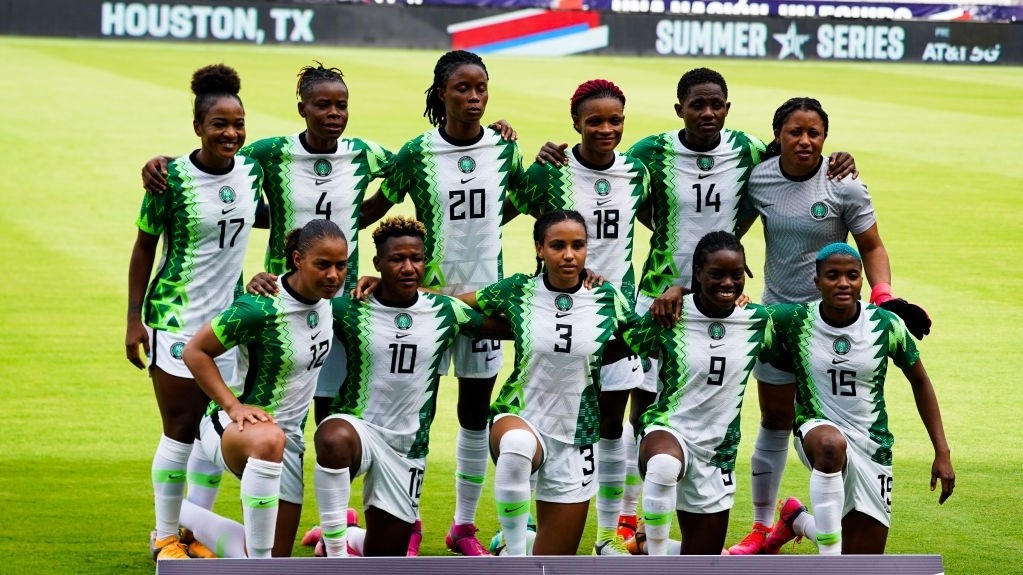After Nigeria’s creditable performance at the last World Cup, nearly beating the eventual finalists England in the last 16, the natural progression for the Super Falcons, the most successful national team in the history of African football, with nine African titles, is to be serious medal contenders at the Paris 2024 Olympics.
But their presence as one of Africa’s two representatives at the summer Games is anything but certain. Although Nigeria have never failed to qualify for the Women’s World Cup since it began in 1991, qualifying for the Olympics has been a different bowl of fruit. It has been the banana skin that the Falcons keep slipping on.
Should they qualify for Paris, it will be a first appearance since the 2008 Olympics in Beijing. “It is really embarrassing for us, as the most dominant team in African football, not to have qualified for the Olympic Games for this long,” a key federation official admitted to the Guardian.
“If we are honest, the problem has been caused by how we, the NFF [Nigeria Football Federation], have poorly managed the affairs of the team over the years, particularly in the period leading up to the qualifiers for the Olympics, especially after playing in a World Cup the year before. We are always having disputes over allowances from World Cups and this gets the team disorganised and unfocused in Olympic qualifiers. It is not acceptable.”
Relations between Randy Waldrum, the American coach who has been in charge of Nigeria since October 2020, and the NFF have been anything but smooth. Waldrum received kudos for the impressive work he did at the World Cup and told the Guardian he wanted a new contract to continue beyond last October.
But despite the NFF’s president, Ibrahim Gusau, stating that an extension would be granted, Waldrum did not get a new deal until last month. Waldrum was blistering in his criticism of the NFF over a range of issues in an explosive interview with the On The Whistle podcast just before the World Cup, saying he would “have quit this job long ago” but for the players.
In the two and a bit months between contracts, Waldrum, who doubles as the head coach of the University of Pittsburgh women’s team, had no active involvement with the Falcons, focusing on his US college team competition commitments. Acutely aware that the NFF – which he said owed him 14 months’ pay before the World Cup – has an extremely poor record on paying wages promptly, Waldrum made his retention of the Pittsburgh job, and doing it in tandem with international management, a precondition for staying.
Justin Madugu, one of Waldrum’s Nigerian assistants at the World Cup, took temporary charge in the interim, handling the Olympic qualifier against Ethiopia. Waldrum will oversee this month’s qualifier against Nigeria’s arch-rivals Cameroon, with the first leg away next Monday, and one final qualifying tie will await the winners.
Perpetua Nkwocha, a four-times African footballer of the year with Nigeria and now a coach in Sweden, is dismayed with the perennial failure to qualify for the Olympics. “There is no continuity in the system, both within the coaching crew and the players,” she says. “They should be kept together to train and play friendlies for better understanding. The players have little time to prepare for a tournament as huge as Olympics … make better provision for the players and care for them, if you expect the best from the players.”
Key Super Falcons players have opted out of the Olympic qualifiers for a variety of publicly stated reasons. At the root of it appears to be a financial dispute with the NFF over unpaid money, some of which was said to date back to 2021. The NFF said in August that any outstanding payments would be made.
“The administrative failure [of the NFF] to secure Randy Waldrum after the World Cup plunged the team into avoidable chaos,” says the Nigerian women’s football expert Samuel Ahmadu. “Waldrum’s return will obviously force a change in tactical coaching approach and fragmentation within the ranks of the squad. ”Many blame Gusau for the disruption in team momentum, saying he inexplicably delayed giving Waldrum a contract extension. But he insists the criticism has been unfair.
“No one has asked me why we had problems with the contract,” he tells the Guardian. “The most important thing is that he is now back and he is working.” Several queries to Mohammed Sanusi, the NFF’s general secretary, went unanswered.
Waldrum’s return will count only if Nigeria’s 16-year Olympic drought is brought to an end this summer. With Cameroon to contend with, that is far from certain.








More Stories
Amorim insists Fernandes not leaving Manchester United amid Madrid reports
How debt burden pushed Nigerian boxer Segun Olanrewaju to a fight that took his life
Nigeria Taekwondo Federation boss, Abdullahi Saidu dies at 53